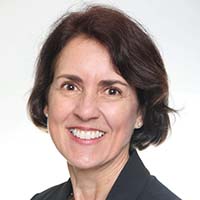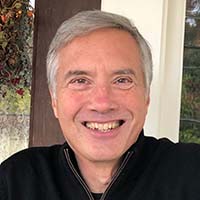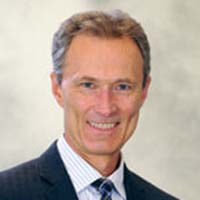Balance Required
As we look at the future of work in this issue, the Great Resignation is upon us. A record 4.5 million Americans quit their jobs in Nov. 2021, according to the Bureau of Labor Statistics. The pandemic created a deeper desire to be fulfilled in one’s vocation, and also brought about a sense of mobility in the labor markets. Our students, graduates, and community partners are asking what good work looks like as we move out of the pandemic.
At SBGE, we have a high view of work. We see work as making a purposeful difference in the world, fulfilling the creation mandate in the Garden of Eden to “till and keep” (Gen. 2:15). The SBGE mission states that work is a means of serving God in the world. Yet as a Christian, I see great value in contextualizing our work by sabbath rest. This perspective encourages us not to idolize our careers and to build our identity as dependent on our Creator God.
In the story of Mary and Martha in Luke 10, Jesus praises Mary for sitting at his feet and listening, and reprimands Martha for being “anxious and troubled about many things” (Luke 10:41). I believe we are meant to have both Mary, the restful listener, and Martha, the worker, in us. Attentive listening to Christ provides the coherence with which our work can be conceived of as service.
For this issue, we wanted to discuss tomorrow’s workplace, and to look at some of the ways SPU is preparing graduates for the future. Also, in light of recent world events, I recommend watching General Barry McCaffrey’s talk to our students on national security. As our students study foreign relations and learn from the experience of General McCaffrey, SBGE prays for and stands with the people of Ukraine and opposes all acts of violence. As we enter the season of Lent, we are reminded of our call to stand with all who suffer in the world and recommit ourselves as agents of peace and justice.
We hope this issue encourages you as you continue to learn and grow in your own endeavors. I wish you the “listening rest” you need to continue to serve God and humanity through your work.
Warm regards,
Ross Stewart
The changing world of work
By Julia Siemens
The way we work in every industry is evolving rapidly. Fully autonomous semi-trucks are being developed and tested. Drive-throughs and check-outs continue to become more automated. And technology allowed for the rapid development of COVID-19 vaccines.
 “The future of work is one where change continues to accelerate. Technical skills will be required for every job, and yet the real differentiator will be the human skills,” said Denny Meadows, a higher education consultant and member of SBGE’s Executive Advisory Board.
“The future of work is one where change continues to accelerate. Technical skills will be required for every job, and yet the real differentiator will be the human skills,” said Denny Meadows, a higher education consultant and member of SBGE’s Executive Advisory Board.
 Jeff Van Duzer, a business consultant and former SPU provost, said change and disruption will bring about a need for “just-in-time skills.” Employees and contract workers may learn these new skills from traditional universities as certificates or “badges,” but there will also be a number of competing sources of training, including some sponsored by prospective employers.
Jeff Van Duzer, a business consultant and former SPU provost, said change and disruption will bring about a need for “just-in-time skills.” Employees and contract workers may learn these new skills from traditional universities as certificates or “badges,” but there will also be a number of competing sources of training, including some sponsored by prospective employers.
“Workers will rely less on what they learned in college 10 or 20 years ago, and more on what they can grab ahold of now,” Van Duzer said.

Bruce Baker, associate professor of business ethics, uses case studies to teach students how to think about tomorrow’s ethical questions. For example, his class has examined Uber’s app to determine if it encourages drivers to stay on the clock or take low-paying fares.
“We ask, ‘Is this a decision that promotes the beauty of what it means to be a human, or is this a decision that takes advantage of human frailty to make a buck?’” Baker said. “In a year, students will be facing a question no one has thought of yet. Our goal is to teach people how to think about these things.”
Meadows said that as change continues to accelerate, it’s important to see the new world of work as an exciting adventure and not as something to be feared.
“Change is the word of the future,” she said. “People who cultivate a love of learning will never struggle to upskill because it’s a part of who they are.”
Future ready: three ways we prepare students
By Lori Brown, Director of the Center for Career and Calling
1. Internships, internships, internships
We are bullish on internships, especially since 65% of internships convert to full-time opportunities. But more than that, internships provide real-world experience and connections, which is why we teach internship classes and prepare students for their first one. The future of work requires smart, nimble, creative, innovative thinkers who work well in diverse teams — the kinds of skills honed in internships and which translate most readily to those needed in tomorrow’s workforce.
2. Build your own social capital now
Relationships matter more than ever. To cut through the noise and competition in the marketplace, building social capital now helps students navigate their careers in the future. Yet students often feel they lack the social capital to launch into careers. “Classmates are your first network, and alumni are your second,” so students get connected with both on LinkedIn and Falcon Connect. In our classes, students learn to build their own social capital, regardless of their social or economic background, by employing the step-by-step Career Launch method to make outside professional connections and uncover the hidden job market, where 80% of jobs reside.
3. Climb a jungle gym, not a ladder
A student’s first job is not their forever job — it’s a launch pad. The average length of time in a new position is 24 months and declining. People will have 12 or more jobs in their lifetime. Students learn to manage their own career because no one else will. We arm students with knowledge about the workforce, talk openly about diversity challenges, and offer tools to discern who they are and what type of vocation best fits them. With our life design focus, they learn how to look at their career in context and build out a fulfilling life.
Advice from a recent graduate
Learning a new job takes time, but 2019 graduate Kaitlyn Payton’s learning curve was particularly steep. She started as a risk analyst for the world’s largest reinsurance broker, Guy Carpenter, in January 2020, and then the pandemic made her job and training program go virtual.
“You have to work hard to understand the industry,” Payton said. “And then when you’re remote and you don’t get the nonverbal cues that you pick up in the office, you have to work double time.”
Payton was not afraid to make meetings with executives, ask questions, and find ways to learn the industry, which she describes as “insurance for insurance companies.” She’s now been promoted to associate broker and is training new hires herself. We spoke with her over Zoom to learn how she’s been able to thrive as a young graduate entering the workforce.
How did you navigate the difficulties of transitioning from being a student to working full time?
I connected with my professors, such as Richard Dadzie, Geri Mason, and Hau Nguyen. Their experience in the workforce helped me figure out how to mitigate my own experience. SPU’s biggest blessing is that there are a lot of mentors. Even now, I can reach out to someone and say, “I know you went to SPU. I did too. I’m interested in finding out more about your job.” The mentorship that I’ve experienced through the network that SPU provided has gotten me to where I am.
How do you achieve work-life balance when you work remotely and everything is so connected?
It’s tough because you’ll get some people who are willing to work 14-hour days and they get begrudged that no one else is helping. In college, I was told to put in the hours, show up, work harder than anyone else, which is true. But at the same time, it creates issues of learning how to set your boundaries. I have to step away sometimes and disconnect, otherwise I’m not worth two cents. I’m learning to listen to my own needs and set my own boundaries personally and professionally.
How do you stay current and adaptable in the workplace?
The biggest thing for me is to find mentors across the board. I have mentors who are professors, brokers in other offices, and people who work at Amazon and Microsoft. I tell the people I mentor to enter every situation as though you want to make a friend, and things fall into place.
Is SPU's MBA program the next step in your calliing?
If you want to become a leader who uses business to serve the common good, consider SPU’s MBA program. The program is now fully online, so you can receive a high-quality, personal, ethics-based, AACSB-accredited business education no matter where you live. The program is particularly relevant for anyone who wants to stay on the cutting edge of technology while also using business to advance human flourishing.
“We are seeing disruptions in the nature of work and in relationships within organizations from globalization, artificial intelligence, the pandemic, and more,” said Gary Karns, associate dean for graduate programs at Seattle Pacific. “SBGE’s approach emphasizes the dignity of persons and the dignity of work. We are all about being great stewards who bring humanity and excellence to helping employees, customers, other stakeholders, and the environment to flourish in and through work and business as an outworking of our Christian worldview.”
If you want to excel in both the hard skills and soft skills needed for tomorrow’s workforce, request more information today!
Welcome new CFB fellows
The Center for Faithful Business is excited to announce the appointment of 25 CFB Fellows. The fellows are scholars or practitioners who faithfully affirm and advance the mission of the center, which is a leading think tank on the integration of faith and business.
Faith & Co. Season Four films available now
Faith & Co. Season 4, Serving the World, is now complete. Faith & Co. is a series of courses and films that examine what it means to act as a faithful follower of Christ in business. The Serving the World course was offered this winter and will be offered again in 2023. You can register for Season Three: Serving Customers in March.
SPU Voices Podcast
Check out our newest SPU Voices Podcast, “Creating Prosperity,” with Tim Hanstad, Chandler Foundation chief executive officer. Hanstad discusses the role of patriarchy in landownership and how his childhood in Mount Vernon influenced his desire to co-found Landesa, the world’s leading land rights organization.
Events
Security expert addresses SPU community
We were honored to have General Barry McCaffrey speak to students on “Challenges to U.S. National Security” for the Distinguished Speaker Series on Oct. 27, 2021. McCaffrey is a retired U.S. Army four-star General who is a national security and terrorism analyst for NBC News. He took a pragmatic, level-headed, and non-partisan approach to national security and answered student questions with warmth and humor.
Pollard Fellowship goes to hybrid format
The Bill Pollard Faith & Business Research Fellowship will be held in a hybrid format this year. The fellowship is a chance for scholars around the world to come together to discuss the writing of Bill Pollard. The scholars will meet remotely in the spring and come to campus for a one-week residency in June.
In Memoriam
Shirley Lansing
Shirley Lansing, a long-time Executive Advisory Board member and friend of Seattle Pacific University, passed away on Nov. 17, 2021. Lansing was known for her faith, service, and success in business.
Lansing began her career doing classified work for the U.S. State Department in Europe and bought an employment agency in Bellevue in 1957. She ran General Employment Service Inc. for five decades. Lansing was one of the first women to join Seattle Rotary in the 1980s and was also a valuable member of the EAB. To learn more about Lansing’s extraordinary life, read her obituary in the Seattle Times.